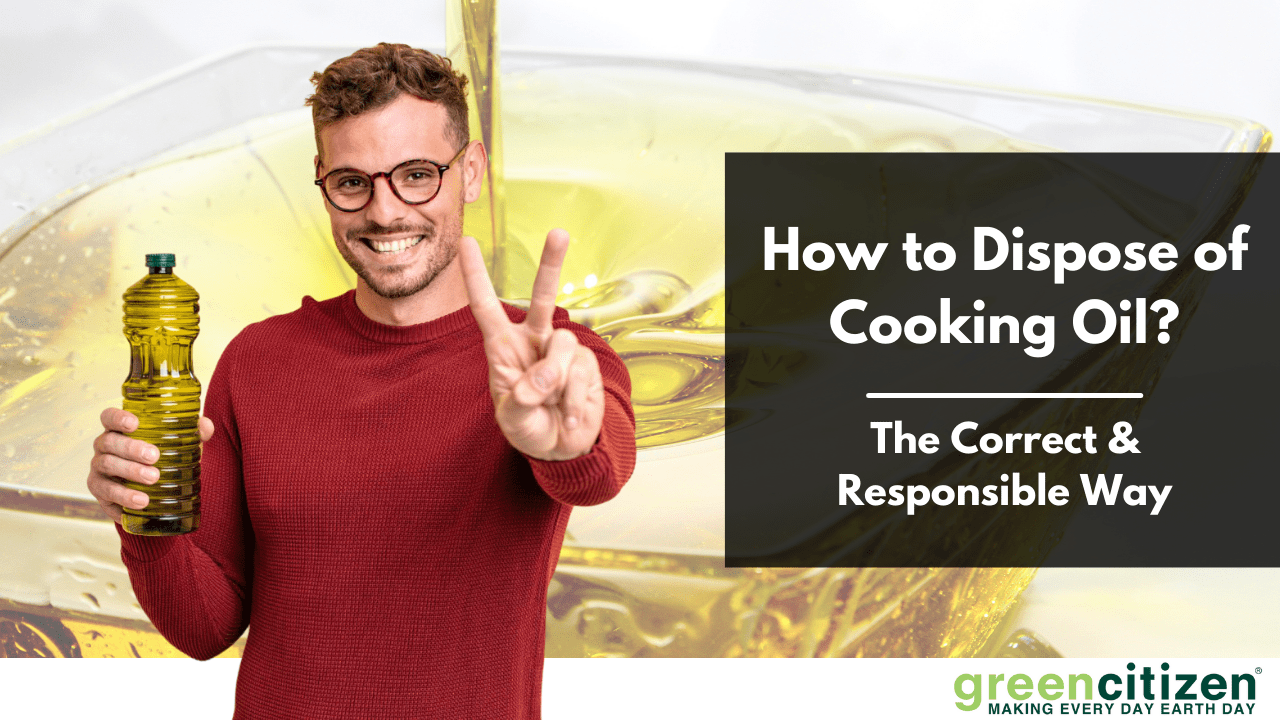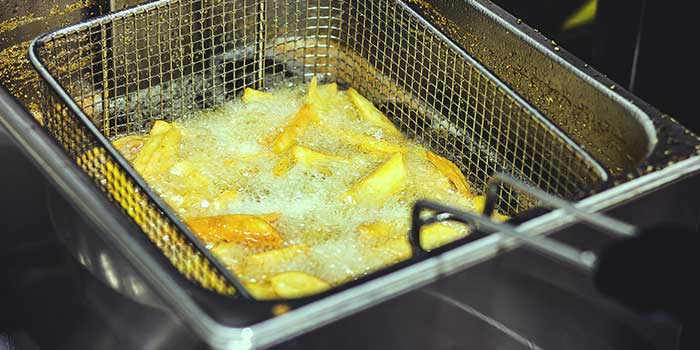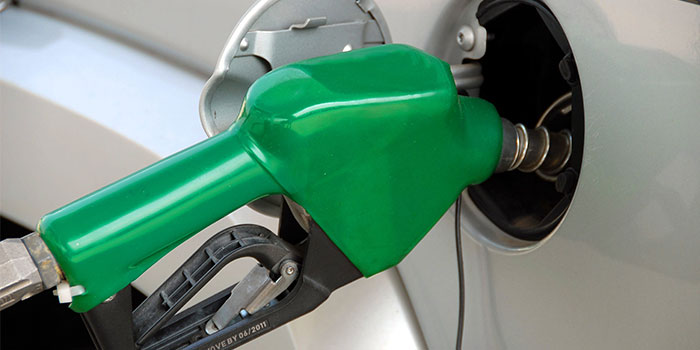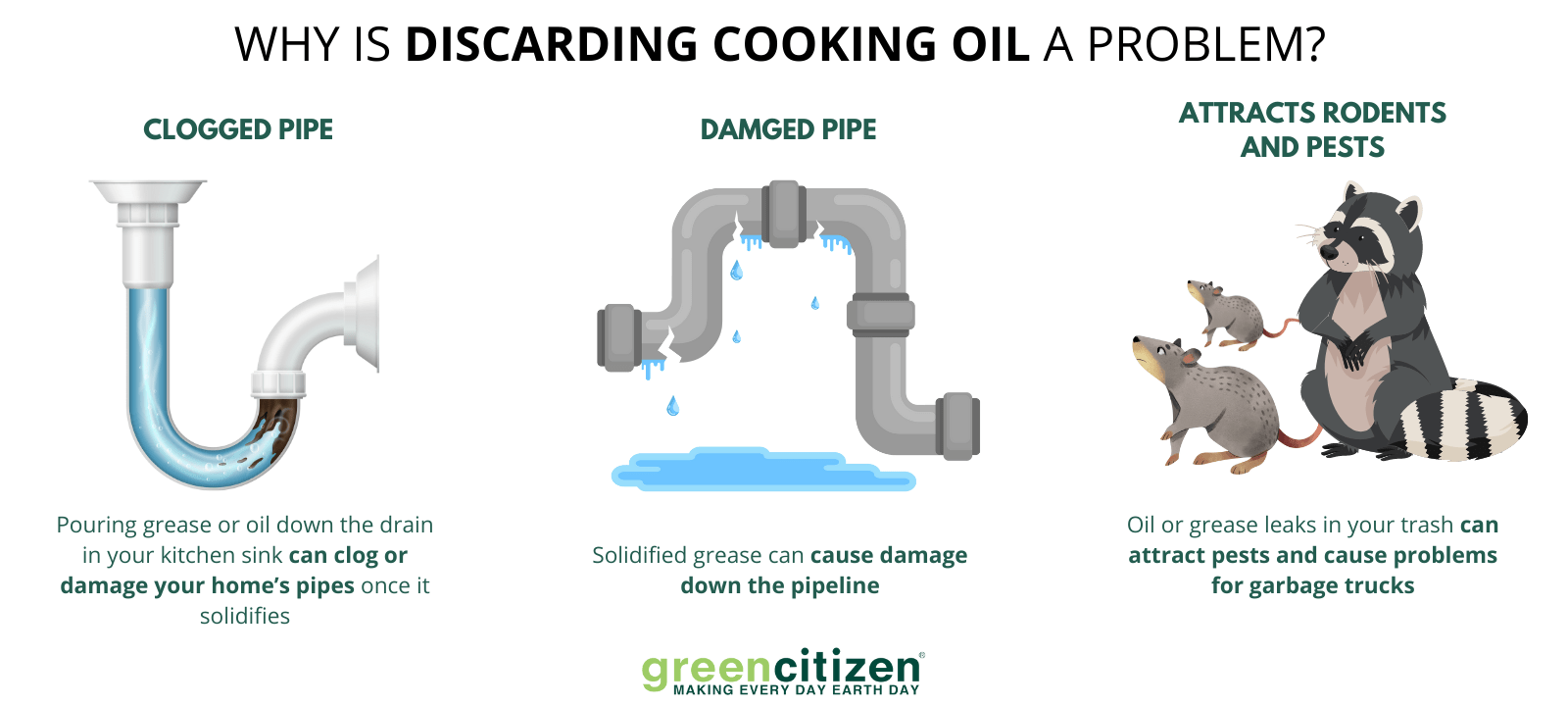Here’s how you can dispose of and turn your used cooking oil into soap, non-toxic pesticide, or biodiesel instead of pouring it down the kitchen drain.

When you pour cooking oil down the drain or garbage disposal, it eventually solidifies and clogs the pipes. This can damage your kitchen plumbing or the local sewer mains of your city.
In Clackamas County, Oregon, for instance, local wastewater treatment services have been struggling to cope with the amount of used oil and grease clogging up their sewage pipes as more people cook at home during the COVID-19 pandemic.
The problem is that many of us just simply don’t know how to get rid of cooking oil safely.
Should you simply include it in the trash? Will the garbage collection take it?
Here we offer you some tips on how to properly dispose of or recycle cooking oil.
How Can I Dispose Of Cooking Oil?
Try the following cooking oil disposal method:
1. Let It Cool
Cooled cooking oil is much easier and safer to work with. If you prefer to deal with solid waste rather than liquid waste, put the grease in your freezer. This is especially the case with vegetable-based oils that remain liquid at room temperature.
But things like bacon grease will solidify once you let it cool down for a few hours.
Also, don’t pour hot oil into anything plastic as it will melt and can become a safety hazard. Instead, use a glass jar to store it temporarily.
2. Solidify Before Oil Disposal
To turn it even more into solid waste, mix it with an absorbent substance like waste flour, sawdust, or cat litter. You can also mix it with other food scraps that are not headed for your compost pile.
3. Avoid Using Plastic Containers
Plastic bags can break easily and cause a mess down the line, especially if there are large quantities of oil and food particles contained in them.
You’ll find that you have the same risk with plastic bottles that can potentially leak if they crack open.
4. Store The Ecologically
You really shouldn’t be dumping a plastic container in the waste, so the only other option you have is to use some form of biodegradable bags or containers. If you have a small cardboard container or even a compost bin liner, then those are better options.
5. Safely Dispose Of In Household Waste
Put the biodegradable container with the cooking oil in it into your bin along with other household waste. Some municipalities also offer a non-compost food waste bin, so it might be worth checking that with your waste management company.
6. Look For A Biofuel Bring Center
Another way that you can dispose of it is by looking for local waste collection centers in your area that will accept cooking oil and turn it into biofuel. Such a grease disposal system is generally a good idea if you have a large volume of cooled oil on a regular basis.
7. Clean Up The Cook Ware
After completing the safe cooking oil disposal, remember to wipe down your cookware with a rag before washing it with water.
Now, a little bit about paper towels: Some people's instinct is to use a sheet of paper towel to wipe away the oil since it's more convenient, but we actually don't recommend that.
This is because paper towels are no longer recyclable once they've been contaminated with food grease. The paper towel industry hasn't always been the greenest industry either. You can read all about it in our article on How to Stop Using Paper Towels.
Here’s a hint — you could opt for reusable paper towels!
Where Can I Dispose Of Used Cooking Oil?
You can dispose of used cooking oil or grease properly at specialized sites. Please consult the Green Directory, a nationwide search engine for recycling centers.
Just go to "Green Directory" at the top of this page, enter “cooking oil” and your zip code to find the drop-off recycling locations closest to you.
The Green Directory can find recycling centers for many household items, including grease.
How to Repurpose Old Cooking Oil?
Knowing how to dispose of cooking oil also means knowing how to use it for something else. Try these methods:
Reuse It

It’s possible to reuse oil 2 or 3 times, as long as it still smells okay. However, take note that its smoking point lowers each time. While you can’t reuse the same cooking oil forever, you might as well get some good use out of it when making fried foods.
Make Soap From It

In case you didn’t know, soap is usually made from fat. This means that making soap from used cooking oil can be a great way to reuse it without just pouring it down the drain or tossing it in the trash.
Help Turn It Into Biodiesel

Used cooking oil can be used as biodiesel. It’s something increasingly common among restaurants in the US, who are donating their used cooking oil and grease to biofuel companies. You can try doing the same thing that those restaurants are doing.
How NOT to Dispose of Cooking Oil and Grease?
Knowing what not to do is just as important as knowing what the right thing to do is.
Don’t Pour Used Cooking Oil Down The Sink
This is a common mistake that people make. While the used oil is still liquid, they turn on the hot water tap and pour the oil down the sink.
The problem is that within minutes, that oil and grease will cool down and solidify. Not only can it clog up the drain pipes in your home, but it can also clog up the sewer system when excessive amounts of bacon fat, oil, and grease end up in sewage systems.
Don’t Add Cooking Oils To Compost Waste
Most cooking oils, even when they are plant-based, end up contaminated with animal products. And you should never put anything animal-based in a compost bin.
This will attract rodents and maggots that pose a health hazard and won’t create the desired compost material for gardening.
Don’t Put Used Oil In Containers For Recycling
Another thing people sometimes do is take a plastic sealable container or foil-lined bags and pour the oil into those. Then they often end up in the recycling bin where they should never end up.
When that grease and oil leaks, it will contaminate everything around it, making it impossible to recycle properly.
Why Is Discarding Cooking Oil A Problem?
Discarding cooking oil is a problem because of several factors:
You can use these Compostable Trash Bags from Second Nature Bags specifically for that purpose.
These leak-proof, unscented bags are made using renewable, bio-based materials.
Some of these materials are sugarcane, plant-starches, and, coincidentally, vegetable oils so folks who have a sensitivity to plastics and toxins will have no problem using them.
These Second Nature Bags come in 13-gallon, 7-gallon, and 3-gallon sizes to accommodate different sizes of trash cans you may have in your home.
If you need something smaller, we can recommend getting these 100% Compostable Sandwich Bags.
Tips for Reducing the Use of Household Cooking Oil
Here are four tips to reduce the amount of cooking oil and grease waste.
Use Cooking Oil With A High Smoke Point
The most common oil for deep frying is corn oil, as it has a smoke point of 450 degrees. Some people have also switched to products like peanut oil which has the same smoke point. Coconut oil is also an option, but it has a lower smoke point of 350 degrees.
While you won’t generally hit those temperatures while cooking, this is a good indication of how long it will last and how many times you can cook with it.
Deep Fry Less Food
Everybody enjoys some deep-fried food, but we should probably all eat less of it.
One option to still enjoy some of the good things in life is not to cook french fries in the deep fryer but in the oven instead. There are plenty of great products out there, and you’ll use a lot less oil.
Invest In An Airfryer
Most things that you would commonly cook in a deep fryer will also taste great out of an air fryer. These still use a small amount of vegetable oil, but it’s nowhere near the amount you’d normally use.
It’s also an awful lot healthier.
Buy A Smaller Deep Fryer
If you don't regularly cook food for a large family or parties of friends, then consider buying the smallest deep fryer you can find.
In a worst-case scenario, you can still prepare food for more people and simply keep it hot in the oven as you cook the food in several batches.
FAQ
You can dispose of frying oil by taking it to a local recycling center that accepts used cooking oil. If you can’t do that, store it in a sealed non-breakable container first before tossing it in the trash.
Yes, you can dispose of cooking oil in the garden for compost, but it should have been used to fry plant-based foods. If it was used to fry meat, it may attract rats, raccoons, and other pests, so just bear that in mind.
Yes, you can put cooking oil in the bin. But you should cool it down first and store it in a sealed non-breakable container (not a plastic bag!) so it won’t leak in the garbage.
You can dispose of expired vegetable oil by tossing it in the trash in a sealed non-breakable container. You can also take it down to a local waste center that accepts grease. This is the most responsible method for disposing of cooking oil.
No, you can’t pour vegetable oil down the drain — the grease will clog up the pipes or cause problems at the local wastewater mains for your area. Reuse it instead or store it in a sealed non-breakable container before you toss it in the trash.
When you pour oil down the sink, the sink will get clogged up as the grease starts to solidify. This can cause your kitchen pipes or the local wastewater mains to overflow, which can be hazardous to our health and the environment.
No, you can’t dump grease down the toilet. If you do, it will clog up your pipeline when the grease solidifies.
You should throw out frying oil after you’ve reused it 2 or 3 times. However, if it smells okay and is still burning hot enough for you, then reusing it a couple of more times should be fine.
Conclusion
From reusing to making biofuel, there are so many inventive ways to get rid of cooking oil and old grease responsibly.
The important thing is to avoid dumping it down the drain, where it will end up blocking the flow and could even end up costing you dearly to call out a plumber.
So, next time you’re about to pour cooking oil away in your kitchen, think again. There are many eco-friendly recycling centers and biodiesel companies that would love to put your cooking oil or kitchen grease to good use.
You can find them all by using our Green Directory.








Pingback: Strawberry Hand Pies - Baking By Cece
Pingback: Can Olive Oil Go Down The Drain/Garbage Disposal? – Get Eatin’
Pingback: Is It Unhealthy to Reuse Oil after Frying? | SustainabilityNook
Pingback: Las formas más ecológicas de desechar el aceite de cocina | Futuro Verde
FYI – I just started composting and all my research so far has said you should not compost oils or butters. They take a really long time to break down and can upset the balance of your compost ecology. Just a note to anyone looking at that option!
Pingback: Grease the Wheels of Change for Frying Oils Everywhere | Leslie Porterfield
Tall trash can liners are certainly easy to find, but small and medium sure aren’t; I can only get Safeway brand in boxes of 20, and they’re always running out. Meanwhile you can get whatever you want in tall; unfortunately, a medium will easily hold two weeks of kitchen trash for me. I suppose people feel they’re getting more with “tall”, and they are- more plastic to go into the landfill. I use a “can” that I made myself- it’s been there 20 years and should easily be good for another 20.
What non breakable container, that is not a plastic bag would you suggest using?
Thank you for this great information.
This is genuinely so good and is such a small effort to do the right thing. Definitely going to make this how I dispose of oil from now. Thank you for sharing this, more power to you.
Great post! Your website is really cool and this is so informative. I think this post is so helpful to us..
I welcome you For this information, I would like more information like this.
THANK YOU
That’s good to know that oil can cause some issues for garbage truck since it attracts pests. I could see how that would make the truck pretty uncomfortable to use if it was filled with insects and other pests. I’ll have to make sure I properly dispose of my oil so I can avoid damaging the garbage truck.